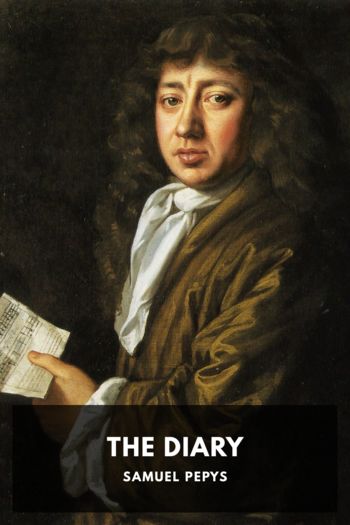The Diary, Samuel Pepys [e reader books TXT] 📗

- Author: Samuel Pepys
Book online «The Diary, Samuel Pepys [e reader books TXT] 📗». Author Samuel Pepys
Hezekiah Burton, of Lound, Nottinghamshire, pensioner of Magdalene College, 1647. His admission to a Wray Fellowship is curious:
“Mar. 8. 1650.
“Hezekias Burton in Artibus Baccalaureus hujus Collij, authoritate ordinationis Parliamentariæ, admissus est in sodalitium Mri. Johannis David, eadem authoritate vacant.”
The last word is not quite clear. —M. B. ↩
Percival Angier. His affairs appear to have got into disorder at the end of 1663, and he became a bankrupt. He died in January, 1664–65, and was buried on the 19th of that month. ↩
William Fairbrother, Fellow of King’s College, Cambridge, was made D.D. of Cambridge, per Regias litteras, in 1661. He was taken prisoner at the battle of Naseby while fighting on the King’s side, and sent to London. ↩
A pamphlet by George Bate, M.D., first published anonymously in 1649, and frequently reprinted. It was translated into Italian and published at Venice in 1652. After the Restoration it was reprinted and a second part added. The following is the title: “Elenchus Motuum nuperorum in Anglia; simul ac juris Regii at Parlamentarii brevis enarratio. A. 2455 Lutetiæ Parisiorum pro R. R. An. Dom. 1649.” 12º. Address to the reader signed “Theodorus Veridicus.” “Elenchi Motuum Nuperorum in Anglia pars prima; simul ac Juris Regii & Parlamentarii brevis enarratio, ab autore Geor. Batio, M.D. Regiæ Majestatis Protomedico recognita & aucta Ære Christianæ Anno 1660. Londini typis J. Flesher & prostant apud R. Royston in Ivy Lane, 1661.” 8vo. “Pars J. Secunda. Simul ac Regiæ Effugii mirabilis è Prætio Wigornia enarratio. Londini, 1663.” ↩
The Tripos or Bachelor of the Stool, who made the speech on Ash Wednesday, when the senior Proctor called him up and exhorted him to be witty but modest withal. Their speeches, especially after the Restoration, tended to be boisterous, and even scurrilous. “26 Martii 1669. Ds Hollis, fellow of Clare Hall is to make a public Recantation in the Bac. Schools for his Tripos speeche.” The Tripos verses still come out, and are circulated on Ash Wednesday. The list of successful candidates for honours is printed on the same paper, hence the term “Tripos” applied to it. ↩
John Peachell, Vicar of Stanwick and Prebendary of Carlisle, made Master of Magdalene College, 1679, suspended from that office and deprived of the Vice-Chancellorship, May 7th, 1687, for refusing to admit Alban Francis, a Benedictine monk, to the degree of Master of Arts without his taking the oaths. He was restored by James II’s letter to the Mastership, October, 1688, and died 1690.
A copy of Dr. Peachell’s sentence as it was fixed on the public School Doors and Magdalene College Gates:
“By His Majesties Commissioners for Ecclesiastical Causes and for the Visitation of the University and of every Collegiate and Cathedral Churches, Colledges, Grammar Schools, Hospitals and other the like Incorporations, or Foundations or Societies.
“Whereas John Peachell, Dr. of Divinity, Vice Chancellour of Cambridge, Master of Magdalen Colledge, in the said University, has been conveñd before us for his disobedience to his Majesties Royal Letters mandatory and other his contempts: and the said Dr. John Peachell having been fully heard thereupon, we have thought fit after mature consideration of the matter to declare, decree and pronounce that the said Dr. John Peachell, shall for the said disobedience and contempt, be deprived from being Vice Chancellour of the said University, and from all power of acting in the same: and also that he be suspended ab officio et beneficio of his Mastership of the said Colledge, during his Majesties pleasure: and accordingly we do by these presents deprive him the said Dr. John Peachell from being Vice Chancellour of the said University and from all power of acting in the same. And we also suspend him ab officio et beneficio of his Mastership of the said Colledge, peremptorily admonishing and requiring him hereby to abstain from the function of Master of the said Colledge, during the said suspension under pain of deprivation from his said Mastership. And we also further order and decree, that the profit and perquisites belonging to his, said Mastership, shall during the same suspension be applyed to the use and benefit of the said Colledge.
“Given under our Seal, the 7th day of May 1687.”
“Finis.”
“I find in the first Lord Dartmouth’s manuscript notes on Bishop Burnet’s History, that Dr. Peachell afterwards starved himself to death, Archbishop Sancroft having rebuked him for setting an ill example in the University by drunkenness and other loose behaviour. He did penance by four days’ abstinence, after which he would have eaten but could not.”
From the Master of Magdalene’s “private” bookFor his red nose, which made Pepys ashamed to be seen with him, see Diary, May 3rd, 1667. —M. B. ↩
The Rose Tavern opened on the Market Hill at the end of Rose Crescent. —M. B. ↩
Then the residence of James Howard, third Earl of Suffolk. It was built by Thomas, the first earl, at the commencement of the seventeenth century, and called after his maternal ancestor. Lord Chancellor Audley, to whom the monastery of Walden, the site of which is occupied by the present house, had been granted at the Dissolution. —B. ↩
The inscription and the bowl are still to be seen at King Edward VI’s almshouses, Saffron Walden. There is an engraving and description of this bowl in Mr. W. H. St. John Hope’s paper, “On the English Medieval Drinking Bowls Called Mazers,” in Archæologia, vol. 1 (p. 163 and plate xiii). ↩
Royal Exchange. ↩
Edward Reynolds, D.D., Preacher of Lincoln’s Inn; Dean of Christ Church, 1648–50; Bishop of Norwich, 1660–1676. He died July 28th, 1676, aged 76. The sermon which Pepys heard was





Comments (0)